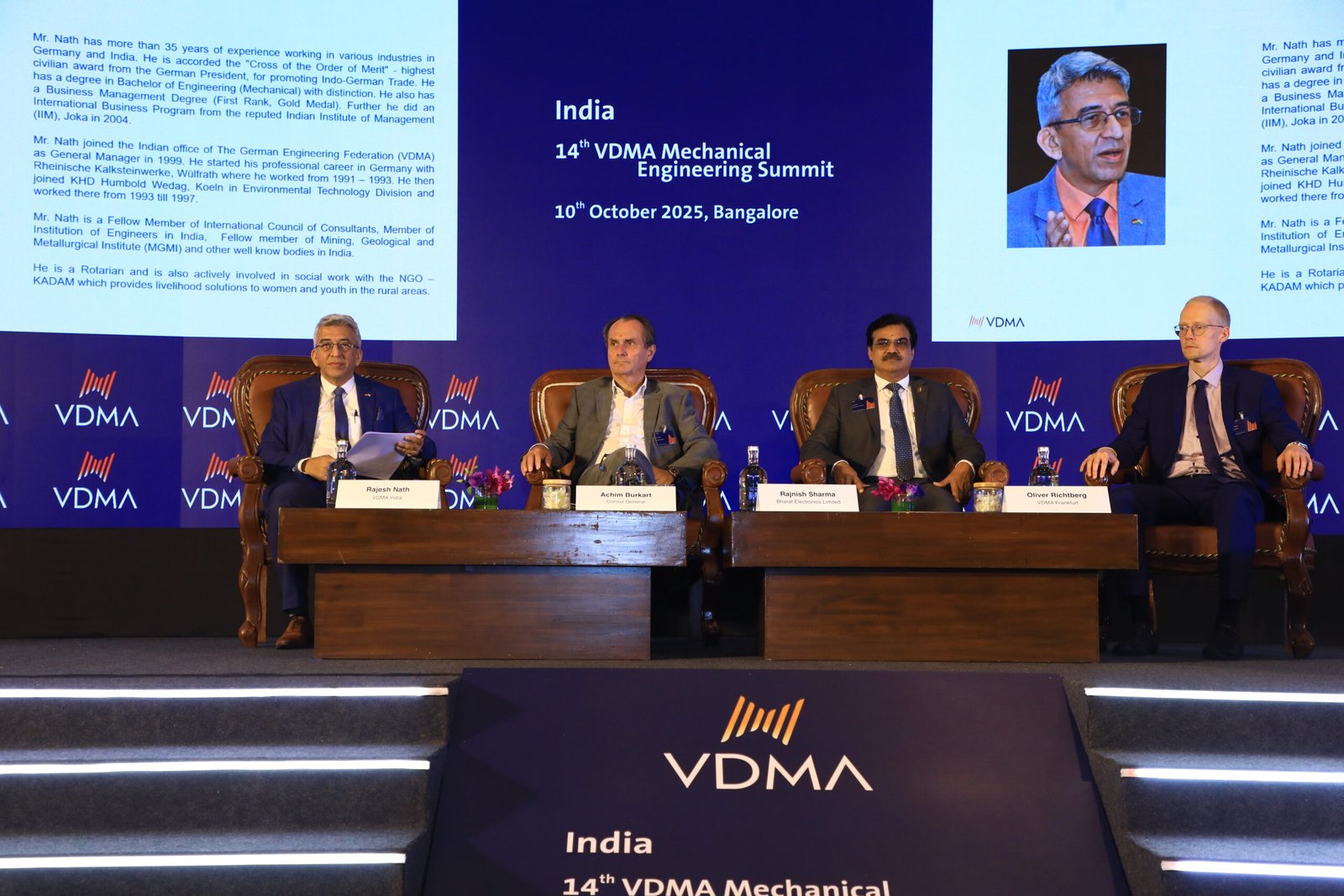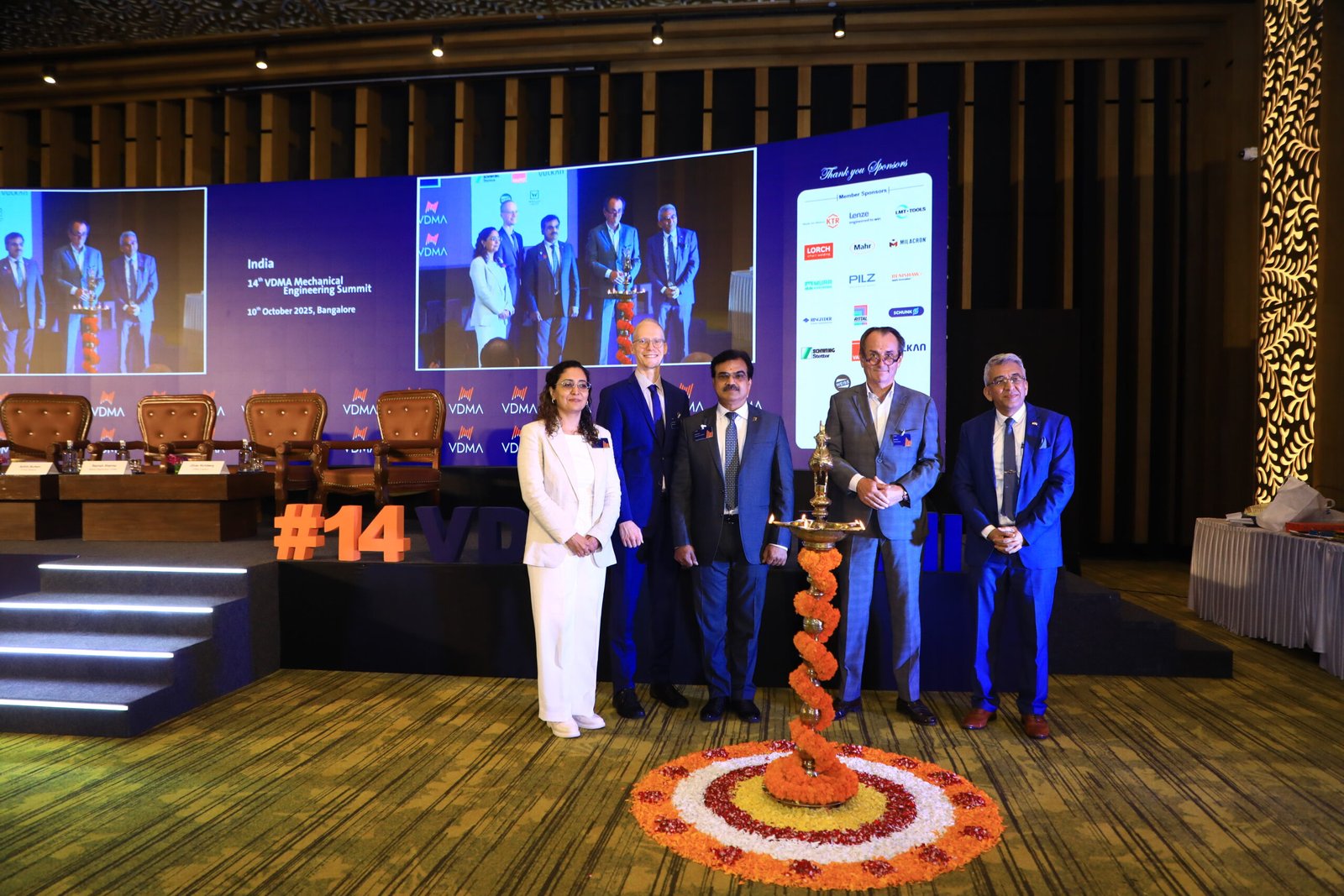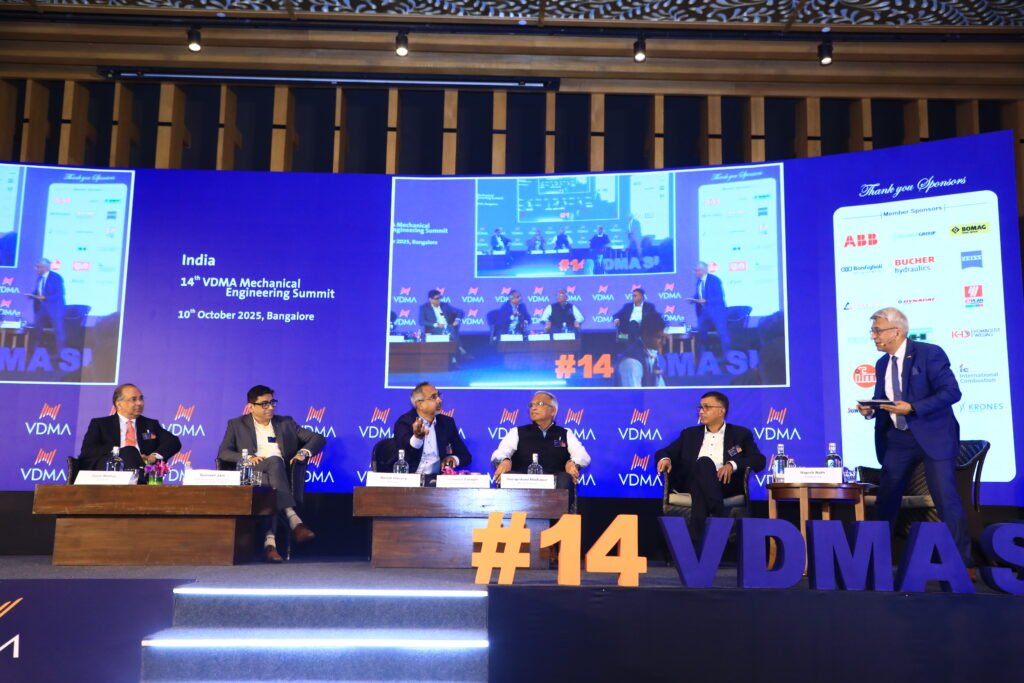
Date: October 10, 2025
Venue: Taj Yeshwantpur, Bengaluru
Organiser: VDMA India
The 14th edition of the VDMA Mechanical Engineering Summit, organised by VDMA India, brought together leading industrialists, policymakers, and technology experts to discuss strategies shaping India’s evolving manufacturing landscape. The summit, held on October 10, 2025, at the Taj Yeshwantpur, Bengaluru, served as a dynamic platform for knowledge exchange, technology updates, and bilateral business engagement between India and Germany.

The summit opened with the lighting of the ceremonial lamp, followed by a welcome address by Mr. Rajesh Nath, Managing Director, VDMA India, who highlighted the event’s role in fostering Indo-German collaboration and advancing mechanical engineering excellence.
Mr. Priyank Kharge, Hon’ble Minister of IT & BT and Rural Development, Government of Karnataka, delivered a special address emphasising Karnataka’s emergence as India’s hub for Global Capability Centers (GCCs), showcasing the state’s leadership in digital innovation, R&D, and advanced manufacturing.
Mr Achim Burkart, Consul General of the Federal Republic of Germany in Karnataka and Kerala, spoke on the EU–India Free Trade Agreement (FTA) and its potential to accelerate bilateral trade and technology partnerships, while Mr Rajnish Sharma, Director at Bharat Electronics Limited (BEL), outlined opportunities for manufacturing growth in India’s expanding defence sector.
The session also witnessed the release of the VDMA Summit Special Issue and a keynote presentation by Mr Oliver Richtberg, Head of Foreign Trade, VDMA Frankfurt, who discussed “The New Global Economic (dis)order – Consequences for the Mechanical Engineering Industry.”
Mr Rahul Bhandurge, Director – Sales & Business Development at BDB India, launched a knowledge paper titled “Powering India’s Future: Strategic Opportunities in Electronics, Semiconductors, and Battery Manufacturing.” His presentation underscored India’s rise as a manufacturing hub for semiconductors, electronics, and energy storage, outlining investment opportunities for German organisations in these strategic sectors.
The knowledge sessions commenced with Mr Atish Laddha, Associate Partner at Roedl & Partner Consulting, presenting “I Want to Trade Free! – The New Era of Free Trade Agreements for India.” He explained India’s evolving FTA framework and its implications for global trade competitiveness.
Ms Anagha Deodhar, Senior Economist at ICICI Bank, followed with a presentation titled “Navigating an Uncertain World,” offering a macroeconomic outlook amidst shifting geopolitical dynamics.
The technological focus deepened with Mr M.R. Subramanya, Vice President, Siemens Technology & Services, discussing “Generative AI Transforming Industrial Automation.” He outlined how AI, particularly Generative AI, is revolutionising industrial decision-making, design, and production efficiency.
Ms Sujhatha A, Senior Manager at Guidance Tamil Nadu, highlighted the state’s position as a manufacturing powerhouse—ranking first in electronics exports, auto components, and textiles—while presenting “Tamil Nadu’s Thriving Manufacturing Sector and Investment Potential.”
A brief Q&A session followed before delegates broke for networking lunch.
The post-lunch session began with the release of a report on “Future-Ready Workforce – Building Skills and Upskilling Strategies for Global SMEs in India,” presented by Mr. Manish Kumar Dwivedi, AGM – HR, Maier Vidorno Altios. His session addressed India’s urgent need for upskilling, highlighting that only 4.7% of the workforce has formal vocational training despite massive demand driven by Industry 4.0 and AI-driven technologies.
The technical session, themed “Accelerating Next-Generation Manufacturing,” showcased leading experts from the automation and technology sectors.
A high-powered panel discussion, moderated by Mr Rajesh Nath, explored the “3Ts” shaping the future of Indian manufacturing—Technology, Talent, and Transformation.
The distinguished panel featured:
The discussion revolved around digital transformation, AI integration, workforce upskilling, and sustainability, with consensus that India’s manufacturing ecosystem is transitioning from automation to intelligence-driven autonomy, positioning the country as a global innovation hub.

One of the key highlights of the summit was the 8th VDMA Manufacturing Excellence Awards 2025, organised in partnership with Roedl & Partner Consulting Private Limited. The awards celebrated outstanding achievements by Indian and Indo-German organisations in advancing sustainability, safety, and responsible business practices within the manufacturing sector.
The awards were presented across three major categories:
Through these awards, VDMA underscored the importance of responsible manufacturing practices and the role of the Indo-German partnership in fostering innovation that balances productivity with sustainability.
The day concluded with concluding remarks and a vote of thanks by Mr. Rajesh Nath, Managing Director, VDMA India, who appreciated the participation of industry leaders and reaffirmed VDMA’s commitment to supporting India’s journey toward smart, sustainable, and inclusive manufacturing growth.
The summit ended with an evening networking cocktail and dinner, providing a relaxed platform for meaningful business interactions and collaboration opportunities.
The 14th VDMA Mechanical Engineering Summit 2025 reaffirmed India’s position as a rising global hub for innovation-driven, sustainable manufacturing, with the Indo-German partnership continuing to power the nation’s journey toward a smarter, greener industrial future.